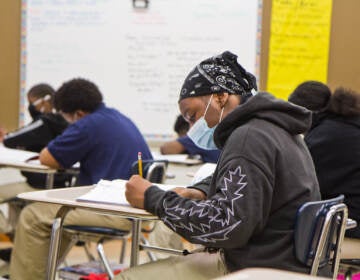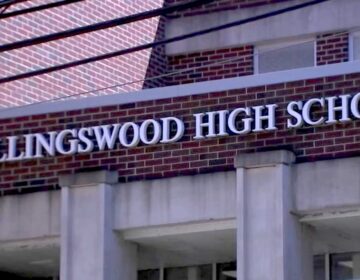Superintendent candidate Hite emphasizes listening and need for healing
If hired as Philadelphia school superintendent, William R. Hite, Jr. said the first thing he would do is travel the city and listen; once as the principal of a new middle school, he knocked on the doors of 660 of the incoming 800 students.
As he made the rounds in a day-long series of meetings Tuesday, Hite painted a picture of himself as an engaged and focused educator, which got a warm response from parents, teachers and community members.
At the same time, Hite said that he was not eager to leave his current job in Prince George’s County, Md., where he has been superintendent for two years and deputy superintendent for three years before that.
“It’s going to be a difficult decision,” said Hite, a new grandfather who came for the day’s marathon meet-and-greet with his wife. “That’s why I’m using this time to really gauge the city of Philadelphia and to determine whether or not I need to make that choice.”
Hite, 50, was the second of two superintendent finalists to meet with members of the public this week. Pedro Martinez, the deputy superintendent in Clark County, Nev., was in Philadelphia Monday.
Like Martinez, Hite said that he was impressed by the “passion” of stakeholders in Philadelphia and offered that the District had the potential to set the standard for urban school reform, despite its fiscal woes and the erosion of trust between its leadership and the public. “It’s uniquely positioned to do that,” he said.
At the same time, from what he’s seen so far about the District’s reform plans, they need work, he said.
“I’ve seen multiple plans – plans for transformation, decentralization, a budget plan, a master plan. … How do you have a conversation about all those plans?”
After the listening tour and a third-party review of the “state of the district,” he would sit down with the School Reform Commission “to really define what is the grand purpose of this work. … Right now, you see multiple plans to do multiple things, and it’s not really a part of, in my opinion, a coherent structure about what this work should be about.”
Audience members seemed to respond well to his commitment to listen, and Hite also spoke about a need for healing.
“That listening campaign is really so that individuals have an opportunity to share their anxieties, their fears, their disappointments, and discuss what has transpired the past six to eight months. I think that’s really important,” he said. “I also think that it creates an opportunity to begin to heal.”
On the hot-button issue of charter schools, Hite said he was “committed to a set of highly effective schools across the city” while being agnostic on who runs them. Responding to a question, he said he was basically in favor of creating a “portfolio” of schools, which is the District’s major reform thrust – although he avoided using the term.
When talking about charters, he emphasized the need for accountability. He told parents that he believes in requiring charters to take percentages of special needs, behind-grade-level, and low-income students commensurate with surrounding neighborhoods.
To questions about whether charters should have enrollment caps and other restrictions, Hite said that it is important to be “intentional” about where they go so they can increase options in underserved neighborhoods and populations.
“What is important is that I’m interested in quality options. But I think regardless of the options, we need an accountability structure that looks at the performance of all those schools,” he said.
He mentioned that all the groups he met with during the day asked about charters, “except the students, which I think is interesting.”
Prince George’s, with 125,000 students in 205 schools, has just seven charters. Hite explained that the charter law in Maryland is very different from that in Pennsylvania.
Asked whether he sees himself as an educator or business person, Hite described himself as a ” lifelong learner … you have to be in this business. There are operational practices I need where I rely on individuals from the business world to help. There are educational practices I have to fall back on that are part of my experience and my zeal to gain knowledge.”
Hite has also had to deal with severe budget cuts – $100 million in each of the last three years – and some 3,000 layoffs. The district also closed eight schools – through a process, he said, that included 26 community meetings.
The teachers’ union, the Prince George’s County Education Association, released a statement Monday that it would be disappointed to see Hite leave.
“PGCEA has enjoyed a collaborative relationship with Dr. Hite during his tenure as Superintendent of the Prince George’s County Public Schools and we will be saddened by the inevitable slowing of our reform agenda should he depart,” wrote PGCEA president Kenneth B. Haines. “The Board of Education, Dr. Hite’s Executive Staff and the PGCEA Leadership team have worked hard to place student achievement at the center of every debate.”
Hite is negotiating a “performance-pay” contract with the union in the wake of a Race to the Top federal grant to Maryland. The grant required using a formula that included “value-added” criteria for student achievement to evaluate teachers. But Hite negotiated an agreement with the union that incorporated other measures in that component besides test scores.
He said he doesn’t yet have faith in the value-added concept.
“Here is my push back on using that as the sole metric: We haven’t figured out how to do it yet, either in Maryland or in the country. How do you attach value to teachers over a period of time?” He said that places doing it are “finding errors in those data,” and said in any case he would want to use the data in a way that “gives us the information we need to improve practice.”
Asked about mistakes that he has learned from, Hite did not miss a beat; he said that one was when the administration he was part of created an internal atmosphere in which people were afraid to speak out.
He learned that it is necessary instead “to create an environment where people feel comfortable to share the type of information people need to hear,” he said.
Hite is a product of the Richmond, Va. schools; his mother worked in a department store, his father for the transit company. He was the first in his family to attend college, because of athletics – he played football at Virginia Tech, where he got a degree in marketing.
He later taught marketing in high school, then went back and got certified to teach middle school reading. He holds a master’s degree in educational leadership from the University of Virginia and a doctorate in educational leadership from Virginia Tech.
Before coming to Prince George’s, he was an area assistant superintendent in Cobb County, GA outside Atlanta, supervising 15 schools and was director of middle school instruction in Henrico County, Va. He was also a middle and high school principal.
Like Martinez, the other finalist, he also attended the influential Broad Superintendents Academy, which trains traditional and nontraditional educators to be urban school leaders.
He has 1,500 followers on twitter and he engaged with Philadelphia tweeters throughout the day.
SRC member Wendell Pritchett, chair of the search committee, said he still hoped to make an offer to one of the two candidates on Friday.
WHYY is your source for fact-based, in-depth journalism and information. As a nonprofit organization, we rely on financial support from readers like you. Please give today.












